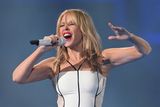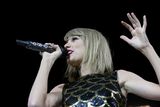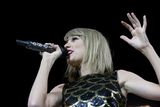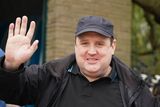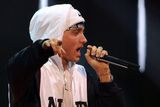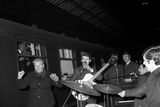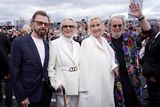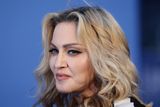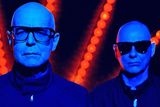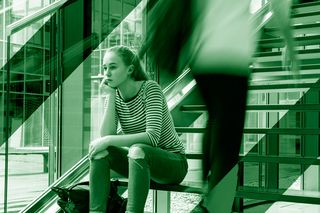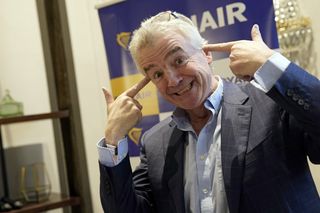Kurt Cobain's death became a JFK moment in the '90s
Kurt Cobain of Nirvana
On Friday, April 8, 1994, Nirvana were supposed to be playing the RDS in Dublin. Instead, an electrician discovered Kurt Cobain's body while working at his mansion in Seattle. Nirvana were already the defining band of the early nineties, but Kurt Cobain's suicide copperfastened that reputation in the most tragic and ghoulish fashion possible.
In 1994, nobody owned a mobile phone, unless they were a high-flying businessman or a drug dealer and kept a brick in their briefcase. Twitter and Facebook didn't exist, even in the most far fetched and feverish of imaginations. Compared to modern standards, the news spread at a snail mail pace.
I heard about Kurt's death while waiting for a bus after a Whipping Boy gig in the now deceased Buttery bar in Trinity College, which used to stage Friday night gigs open to all comers for less than the price of a pint. I didn't believe it. I dearly hoped it was a stupid and tasteless rumour. I stayed up late to watch an MTV News bulletin that confirmed his death. Many years later when I spoke to Whipping Boy, they said they'll never forget that gig because of the terrible news that came through from Seattle when they came off-stage.
Approximately a thousand Nirvana fans gathered at an impromptu vigil the following Sunday afternoon at the Wellington Monument in the Phoenix Park. The only way of publicising the event was by word of mouth and a few posters in record shops around the city. Fans played Nirvana songs and lit candles. The atmosphere was sombre but touching. Considering that 7,000 participated in a vigil in Seattle where Courtney Love read out her husband's suicide note, this was a highly impressive turnout.
Kurt Cobain deeply resonated with Ireland, but Ireland also resonated very deeply with Kurt Cobain. "I've never known my ancestry," Kurt once told an interviewer. "I didn't know this year that the name Cobain is Irish. I found through flipping through phone books. I couldn't find any Cobains, so I tried Coburns. I found this lady in San Francisco who had researched our family history. We came from County Cork, which is a weird coincidence, because when we toured we played Cork. The entire day I walked around Cork in a daze. I never felt more spiritual in my life. I was almost in tears, it was the weirdest thing."
I interviewed Nirvana co-founder and Kurt's best friend Krist Novoselic in 2011 to mark twenty years since the release of their breakthrough album Nevermind. He told me that the band loved going to Ireland because the beer was good and there was no language barrier. They played Sir Henrys in Cork, the Top Hat in Dún Laoghaire (supporting their mentors Sonic Youth) and the King's Hall in Belfast.
Nirvana played the Point Depot on June 22, 1992, on a bill that featured The Breeders and Teenage Fanclub. The dockside venue wasn't remotely like the state-of-the-art O2 Arena of today with its abundance of toilets, bars and convenient exits. Amazingly, this gig was rescheduled from the now deceased but very fondly remembered McGonagle's venue on South Anne Street. The modern equivalent would be for an act to leapfrog from Whelan's straight to the O2.
If memory serves me correctly, tickets were £12.50. Tommy Tighe's Sound Cellar on Nassau Street then provided the invaluable service of reserving your ticket for a fiver and you settled the balance when you picked it up. This was another world away from today's online vendors like Ticketmaster. It was also the only way I could afford to save up for gigs but stil be able to secure a ticket on the day they went on sale.
Bizarrely, you can now watch the entire Nirvana Point show on YouTube, which some enterprising soul recorded with absolutely no knowledge that years later pretty much anyone could be able to watch it on demand. Back then, concert bootlegs were tacky looking things with terrible photocopied sleeves sold on dodgy cassettes from mobile stalls on O'Connell Bridge, designed to flee the scene of the crime if a Garda appeared on the beat. It was a lucky dip whether you got a copy of the right show, let alone a listenable recording for somewhere in the region of £4 or £5.
Nirvana exploded with the release of 'Smells Like Teen Spirit'. Many a house party and dance floor was demolished by an infamous song that remains a stone cold classic.
"I don't exactly know what 'Teen Spirit' means, but you know it means something, and it's intense as hell," opined Nevermind producer Butch Vig. Its power remains undimmed over two decades later. Spend a night in many a bar the length and breadth of the land and that immortal riff is virtually guaranteed to blast out of the speakers.
Nineteen ninety four was an eventful year. The IRA announced a ceasefire. Ireland beat Italy at the World Cup in the Giants' Stadium in New York. The government collapsed and John Bruton became Taoiseach. While the events of this tumultuous year defined the subsequent Peace Process and the Good Friday Agreement, for me and many, many others, the JFK moment of 1994 will still be the death of Kurt Cobain. While some might consider that to sound somewhat trivial and frivolous, it is 110pc true.
20 years later and Robin Williams has become the latest high profile casualty of suicide. Williams was another remarkably talented man who violently shuffled off this mortal coil far too soon. This is the Throwback issue of INSIDER, but sometimes we're reminded how history just repeats itself.
In the interim years, Richey Edwards from Manic Street Preachers and Amy Winehouse have also become members of what Kurt's mother Wendy Cobain lamented as a "stupid club." She said: "Now he's gone and joined that stupid club. "I told him not to join that stupid club."
When Amy Winehouse died, loads of us heard about the news long before any official announcement. People argued whether or not she was in the 27 Club before the poor woman was officially pronounced dead.
"I have never failed to fail," Cobain sang on 'You Know You're Right', which was recorded two months before his death. This lyric tips a hat to Samuel Beckett, who was one of Kurt's literary heroes. It also offers a glimpse to just how brilliant the band could've continued to be.
When Nevermind went to number one, Cobain was living in his car. Despite the adoration of millions and making millions, he could never shake off his demons. The music industry's biggest mission became to find the next Nirvana. They failed. There hasn't been anyone like them since and there never will.
Let's leave the last word to Kurt's best buddy Krist Novoselic. "I miss Kurt and things shouldn't have happened how they did, but they did. Life goes on. You do your thing, but let's not forget that what brought all the attention to the band and sucked us in to this swirl and notoriety in the first place was purely the music and how it spoke to so many people.
"People come up to me and say, 'Krist, Nevermind changed my life'. That's when I remember Kurt and how committed, focused and compelled to do things he was. I always chalk one up for Kurt when I hear that."
Join the Irish Independent WhatsApp channel
Stay up to date with all the latest news
